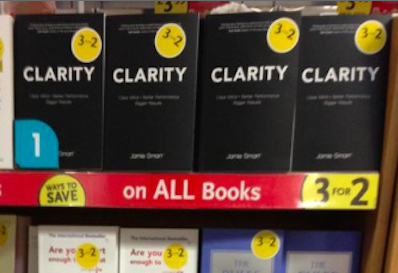JST 52 – Praise, criticism and the clarity polarity phenomenon
"A moment’s insight is sometimes worth a life’s experience."
Oliver Wendell Holmes
I'm delighted to be able to announce that my publisher, Wiley, will be releasing a "slimmed down" version of my CLARITY in the spring, entitled The Little Book of Clarity. I'm really excited about this, as it will give us an opportunity to share this understanding with an even larger audience, and touch more lives. As a taster, I've decided to share the Preface from the new book with you. The Preface sheds light on a curious "clarity polarity" phenomenon that I've seen since the original book was launched in 2013. I hope you enjoy it, and would love to know what you think of it (feel free to post your comments on the blog).
Excerpt from The Little Book of Clarity © Jamie Smart
This book’s predecessor, CLARITY: Clear Mind, Better Performance, Bigger Results, evoked a polarity-response when it was launched in early 2013. Many people loved CLARITY (the book became an international number 1 bestseller, a gratifying response for any author.) But while the majority of Amazon reviewers gave the book 5 stars, explaining how CLARITY had transformed their lives, a full 10% of reviewers gave the book 1 star, with criticisms ranging from “too simplistic” to “too complicated” and various points in between.
This polarisation was not unexpected. I’ve been sharing the principles behind clarity with individuals and groups since 2009, and the response to the book mirrors those of my public speaking audiences. In fact, it’s quite predictable given the core message of CLARITY – that a clear mind is your natural state, and there’s nothing you need to do to clear it; that our misguided attempts to clear the mind often result in more of what was clouding them in the first place. This assertion flies in the face of the personal development norm of telling people “what and how to think and do” in order to have the results you desire.
But some of the most fascinating feedback started arriving six months after the book’s publication. People started coming up to me after talks and telling me in hushed tones that when they first read CLARITY, it hadn’t made sense to them, but when they went back to the book a few months later, something strange had happened. They discovered that it not only made sense, but that they’d incorporated the lessons from their first time reading the book without even realising it.
This makes perfect sense. While most personal development approaches offer “additive” advice (tips, techniques and concepts to remember, practice and apply) the principles behind clarity are ruthlessly subtractive…
Understanding these principles takes things off your mind rather than giving you more to think about.
The revelation that the mind is a self-correcting system resonated deeply with many people. Liverpool striker Daniel Sturridge scored his first Premier League hat-trick against Fulham in May 2013, then arrived at his post-match interview carrying a copy of CLARITY. One of my clients, Bluecrest Health Screening, started including a CLARITY Quotient section in their screenings, empowering corporate clients to take charge of their engagement and stress levels. Demand for training in the principles behind clarity has continued to increase, and a growing community of professionals are being certified as Clarity Coaches, Practitioners and Trainers.
Which brings us to an important question: Why a little book of CLARITY?
The acceleration of technology, information and communication has continued to increase since CLARITY was published. People are even busier and assailed by even greater demands on their precious time and attention. In the face of this, the idea of a concise version of CLARITY pared down to the bare essentials started becoming more and more attractive. It would provide an opportunity for me to further simplify and clarify the central message of the book, and to update some of the terminology. Perhaps most importantly, it would mean that new readers could be introduced of the principles behind CLARITY, and start experiencing the benefits in their work, their relationships and their lives as a whole.
Believe it or not, I receive messages most days from people telling me what an enormous difference understanding these principles has made in their lives. While some have found new relationships, careers and life circumstances, the more universal discoveries are new hope, clarity and freedom. The promises of a clear mind, better performance and bigger results are underpinned by something that’s there for all of us: the discovery of where your experience is coming from, what you’re up to in life and who you really are.
